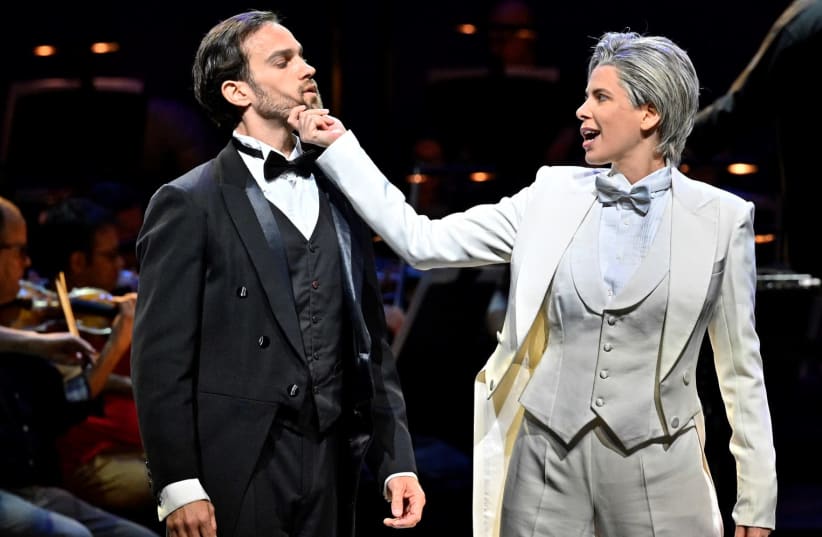The Israeli Opera soared on leather wings on the evening of May 4 during the premiere of Die Fledermaus (The Bat). This well-liked operetta tells the story of how Dr. Falke (Noah Briger) executes a delightful prank at the expense of his friend, solid Viennese citizen Gabriel von Eisenstein (Oded Reich) for leaving him on a park bench to sleep off a night of drinking while dressed in a bat costume. Composed by Strauss the Younger and first performed in 1874, the operetta quickly became a hit for its unusual blend of lightheartedness, excellent waltz music and thinly veiled criticism of romantic and social power relations.
Conductor Dan Ettinger, with his well-coiffed head of white hair and sparkling energy, was a marvel to behold as he led the musicians on a no-holds-barred 90-minute performance. Ettinger uses his entire body to conduct: fingers, baton and facial expressions included. At times he even bounces, stopping only briefly to dab his forehead with a handkerchief.
Director Ido Ricklin was able to skillfully re-construct the three-act operetta thanks to the remarkable talents working with him. To overcome the lack of painted sets, dancers Nophar Levinger and Yiftach Mizrahi create mini-sets with props and, it often seems, sheer magic. A sheet becomes a bed where Rosalinde (Elinor Sohn) speaks with her former lover Alfred (Eitan Drori). Pillows are used comically to express how their parting takes far too long as the dancers slam their heads into them in frustration. From the moment we see the duet between Sohn and Drori rudely, so to speak, “interrupted” by Yael Levita in her role as the maid Adele we laugh and are happy to go anywhere Ricklin decides to take us to. The comedy is enhanced by Sohn pretending to seek the attention of Ettinger to “ratify” this wrongdoing and him urging her to return to the stage and face the music. Movement Designer Yiftach Mizrahi excelled in guiding the singers and dancers in using the stage in endless creative means, ensuring we believe they, and us, inhabit a much larger world.
Due to most of the plot being acted out in Hebrew with the famous arias sung in German with large, clear, captions in English and Hebrew were provided for the benefit of the viewers. The production is an excellent starting point to introduce a younger nephew or cousin to the delights of the opera. The translation, by Israel Ouval, is masterful. The audience was delighted to hear Eisenstein (Oded Reich) ask his new love interest “why do you wear a mask; we can take it off!” in a nod toward the COVID-19 health restrictions that, until very recently, made any night at the opera pure fantasy. Seeing as his new love-interest is his real-world wife in disguise, she does not.
People pretending to be what they are not is a recurring theme in this operetta. Rosalinda pretends to be a Hungarian Countess. Her maid (Levita) pretends to be a woman of noble birth at the party a prince is having. Eisenstein and Frank (Yuri Kissin) pretend to speak French and are only able to say silly things such as “baguette.” This, in turns, delights Prince Orlofsky (Tal Bergman) who can, in fact, speak French.
In a cast of extremely talented persons, Bergman shines in the role of the brutal Orlofsky and more than one audience member stood up to cheer her performance. The crowd also responded with roaring delight to the brilliant performance by Levita of Mein Herr Marquis (Adele’s Laughing Song) during which she convinces Eisenstein his own eyes deceive him and that she cannot possibly be a maid.
Why do we respond so well to the long-gone conventions of Viennese society? A part of the answer might be the familiarity of its everyday life. When Sohn laments during “O Gott, wie rührt mich dies!” (Oh dear, oh dear, how sorry I am) that, with Eisenstein behind bars, she will be reminded of his absence daily as she stars at his empty coffee mug in the morning. We can recognize such a scene and relate. Another part might be due to the shrewd eye used to depict power relations in society. When Bergman sings “Ich lade gern mir Gäste ein” (I love to invite my friends) she makes no bones about how brutal the prince is toward guests who displease him. Why? “Chacun son gout!” (To each his own taste), especially when one is rich and powerful. The placing of this scene long after Adele begging her mistress for a night off hints that even people bereft of nobility titles, who drink their morning coffee at home, can be unfeeling at times.
Such veiled jabs at conventional morality and the social order should not be taken too seriously. The Israeli Opera had produced a fabulous production of The Bat and, as this is Strauss we are talking about, all will work out well in the end.
